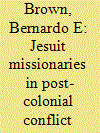| Srl | Item |
| 1 |
ID:
136296


|
|
|
|
|
| Summary/Abstract |
Sri Lankan Catholic migrants find Italy to be a destination that offers plenty of opportunities for material advancement. However, as employment for skilled workers is scarce, lack of formal education becomes a comparative advantage in the Italian migrant labor market. The multiple ways in which migrants to Italy display their economic success across Sri Lankan hometowns have encouraged young people to opt for migration over schooling, an unlikely phenomenon in a community proud of its tradition of excellence in education. This article suggests that the dream of moving to Italy and finding employment in low-paying jobs is not only a consequence of the material evidence provided by successful migrants. Ideological and ethical changes that precede the booming transnationalism have produced transformations at the level of the imagination that shape the dreams of local youths before they experience what migration can bring. Fieldwork research is based in the predominantly Catholic town of Wennappuwa – which has uncannily embraced the Sinhala moniker of Punchi Italia (Little Italy) – and explores the way in which migration has displaced traditional paths to economic prosperity and social mobility, leaving behind its reputation as Sri Lanka's Guru Gama (Teacher's Village).
|
|
|
|
|
|
|
|
|
|
|
|
|
|
|
|
| 2 |
ID:
142831


|
|
|
|
|
| Summary/Abstract |
In August 1990, Father Eugene John Hebert SJ disappeared while trying to reach his home in the Sri Lankan city of Batticaloa. Caught in the midst of the turmoil that confronted Tamil and Muslim minorities after the peace-keeping operations led by the Indian armed forces collapsed, Father Hebert was one of thousands of victims who perished in the violence that engulfed the Eastern Province of Sri Lanka between June and September 1990. Since the early stages of the ethnic conflict (1983–2009), American Jesuits stationed in Tamil-speaking areas of the island had become de facto human rights activists, being virtually the only remaining trusted mediators between the different factions involved in the armed confrontation. Their efforts to foster peace and dialogue in the region were far from their original assignment as educators—which Father Hebert had been conducting since his arrival in 1948. This article not only traces Father Hebert's life trajectory from Louisiana to Sri Lanka, it also reflects on the cultural impact that the presence of American Jesuits had in the entire region, as well as on the changing responsibilities they assumed in the volatile political context of the island that took them from coaching basketball to becoming catalysts for peace.
|
|
|
|
|
|
|
|
|
|
|
|
|
|
|
|